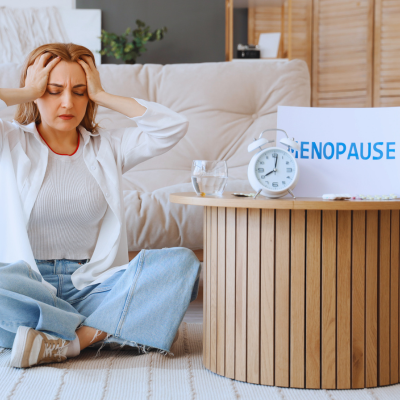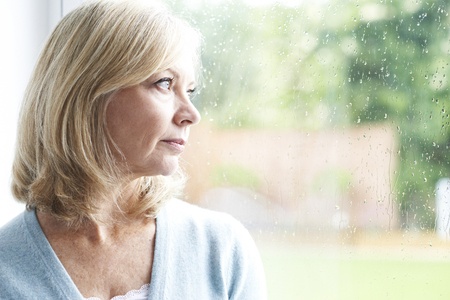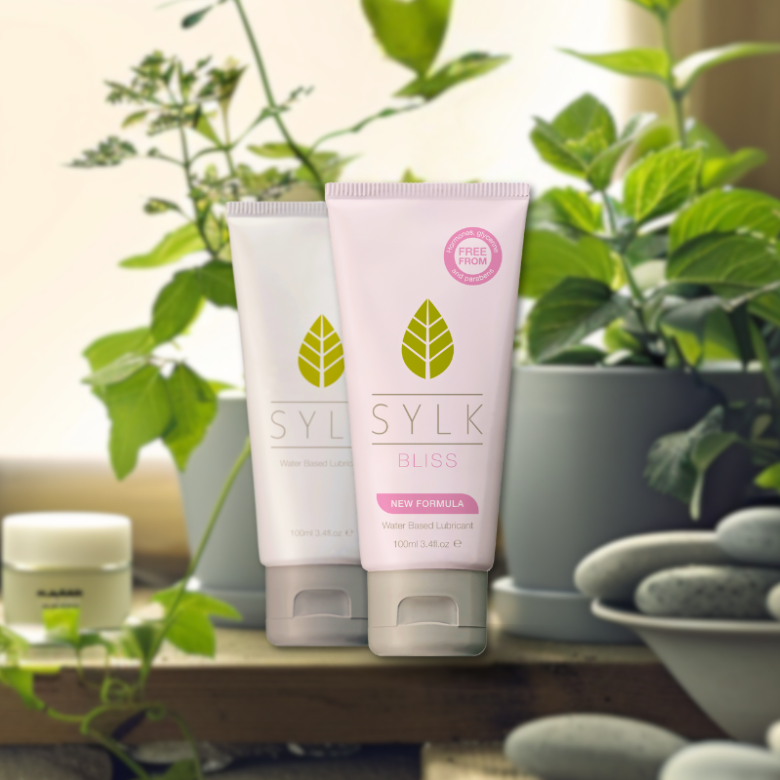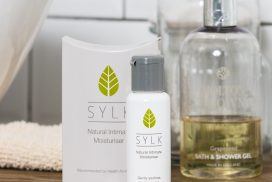In this article, we'll ask what happens to a woman as she approaches the menopause and beyond, and why it can cause vaginal dryness. We'll look at symptoms and how menopause dryness can affect your life, not just your sex life, and what to do about it.
What is the menopause?
Menopause literally means the last period. A woman is diagnosed as being ‘menopausal’ when her last menstrual period was one year ago.
Once our ovaries stop producing eggs, the menopause occurs and as a result the levels of hormones called oestrogen and progesterone fall, which affects many parts of our bodies including our skin, heart, bones and vagina.

What are the symptoms of the menopause?
Menopausal symptoms vary between women. Some will only experience them for a few months whilst others can continue to suffer for many years even after their last period. Whilst symptoms like hot flashes, mood swings and night sweats are well known, others like brain fog and vaginal dryness are less so. For more information, Kathy Abernathy, Menopause Specialist lists a whole raft of symptons in our blog here: Managing Midlife, Menopause and Beyond.
There are many treatments that will help control symptoms, like HRT or other natural alternatives, not discounting diet, exercise and lifestyle, which your GP can discuss with you.

When does the menopause occur?
Menopause usually occurs between the ages of 45-55. The average age of the menopause in the UK is 51 years old, and if you are black or asian it is 47-48. This can also be earlier for some women, particularly if you started menstruating at a young age. And at the other end of the scale, some women still have periods into their 60s.
Perimenopausal symptoms usually occur at around 45 years of age. If the menopause occurs before the age of 40 it is classed as Premature Ovarian Insufficiency (POI). Some women may experience an ‘early’ menopause due to having cancer treatment (radiotherapy) or hysterectomy.
The perimenopause is the time when you may be experiencing some menopausal symptoms but are still having periods, though they may be more irregular and heavier or lighter than previously. This is due to fluctuating hormone levels as you transition to the menopause.
The time in your life after the menopause is referred to as post-menopause. Most symptoms like hot flashes and palpitations will disappear, but vaginal dryness is one condition that won’t go away.
Glossary
Pre-Menopause the time in your life before any symptoms occur
Peri-menopausethe time leading up to the menopause when your hormone production reduces and you may start to experience symptoms.
Post-menopausethe time in your life after your menopause when symptoms like female dryness may persist
How common is vaginal dryness after menopause?
Vaginal dryness is one of the most common but least talked about symptoms of menopause and postmenopausal life. In fact, up to 80% of the UK’s 13 million peri- and postmenopausal women experience vaginal dryness. However, only a third will seek medical help. That’s where safe, natural solutions like Sylk come in.
Who needs a lubricant for menopause?
- 13 million women in the UK are currently peri- or postmenopausal (80% of those will suffer vaginal dryness yet only a third will seek medical help)
- Older women who experience vaginal dryness due to hormonal changes
- Women recovering from cancer treatments or hysterectomy
- Sylk is designed for any woman seeking a personal, natural lubricant to combat the effects of declining oestrogen
Why does menopause dryness happen?
The hormone oestrogen affects many parts of our body including the vagina. It acts as a natural lubricant and helps keep the vagina moist and comfortable. As levels of oestrogen fall, as we transition through the menopause, the tissues around the vagina can become thinner, dryer and inflamed. It can take months or years for these symptoms to develop and the severity will vary between women.
Love-making is often when many women first notice vaginal discomfort, as the lack of oestrogen may cause the vagina to shrink a little and expand less easily during sex. These changes may make intercourse after menopause uncomfortable—causing many women to avoid intimacy altogether. Every day activities can also be affected by vaginal dryness. So, even though vaginal dryness may seem to be a minor physical problem, it can negatively impact our daily lives, our emotions and our relationships, which is why women so often say that Sylk is a godsend for them and such a relief to find.
Sylk is recommended by:
- GPs
- The UK Menopause Nurse Group
- The British Menopause Society
- Menopause specialists
What are the symptoms of vaginal dryness?
You may think that it’s self explanatory that vaginal dryness would just feel like that, dry. But imagine if you had dry eyes, actually you would be bothered by itching, scratchiness, soreness or even minor tears and bleeding.
In a similar way, with vaginal dryness the symptoms that you are likely to experience can include:
- Feeling itchy and sore in and around your vagina as you go about your day
- Feeling discomfort or pain during sex
- And if you don’t treat these symptoms, and the skin of your vagina becomes very thin, you may experience tiny tears and bleeding
That’s why it’s so important to use a lubricant or vaginal moisturiser early, as soon as you start experiencing symptoms of vaginal dryness in perimenopause or after menopause. However, we also recommend that you visit your family doctor as well, as you may benefit from additional treatments, such as HRT or oestrogen cream.
What is the best lubricant for menopause dryness?
If you’re wondering, “What is the best lubricant for menopause?” — the answer lies in choosing a natural, hormone-free, paraben-free and glycerin-free product that’s safe, effective, and recommended by experts.
It's also really important to choose a vaginal lube that has a pH level which matches the naturally acidic environment of the vagina, usually between 3.8 and 4.5. This inhibits the growth of harmful bacteria and yeast, helps prevent infection and keep your vagina healthy.
Sylk is widely recommended by health professionals as it is regarded as one of the best lubricants for menopause and post-menopausal dryness. Its pH level support the health of the vagina; it's water-based, so does not leave any oily residue and feels very natural, and it does not have an odour. Being water-based also means it's safe to use with condoms.
What do our customers say about how Sylk feels?
"As someone who went through the menopause at a young age, vaginal dryness is something I have battled with for a long time and trying to find natural, comfortable lubricants has been a challenge!"
"Sylk Bliss has such a lovely texture and a little goes a long way. It made sex more comfortable and is very moisturising, it’s been a real treat to use" - Kerry
“My husband and I have tried many lubricants since my GP diagnosed menopause, with little success, and both agree Sylk is an absolutely wonderful product!"
"No odour, non-greasy and no need to re-apply. It feels natural, like silk, no irritation or discomfort."
"I am so relieved to have finally found a lubricant that has taken away the pain of being intimate and I now have a very happy husband.” - Vikki
Immediate relief from female dryness
Sylk has been specially formulated to provide immediate relief from vaginal dryness whilst nourishing and hydrating delicate tissues. Sylk gently and effectively provides silky smooth lubrication that makes love-making or just the everyday more comfortable.
Whether you're seeking the safest lubricant for sensitive skin, or the best female lubricant to restore comfort and intimacy, Sylk delivers silky smooth relief that feels natural and gentle.
Quite simply there’s nothing like Sylk for effective and naturally gentle lubrication
- Gentle, safe relief from menopause dryness
- Free from hormones and parabens
- Can be used in conjunction with HRT and topical oestrogen cream






